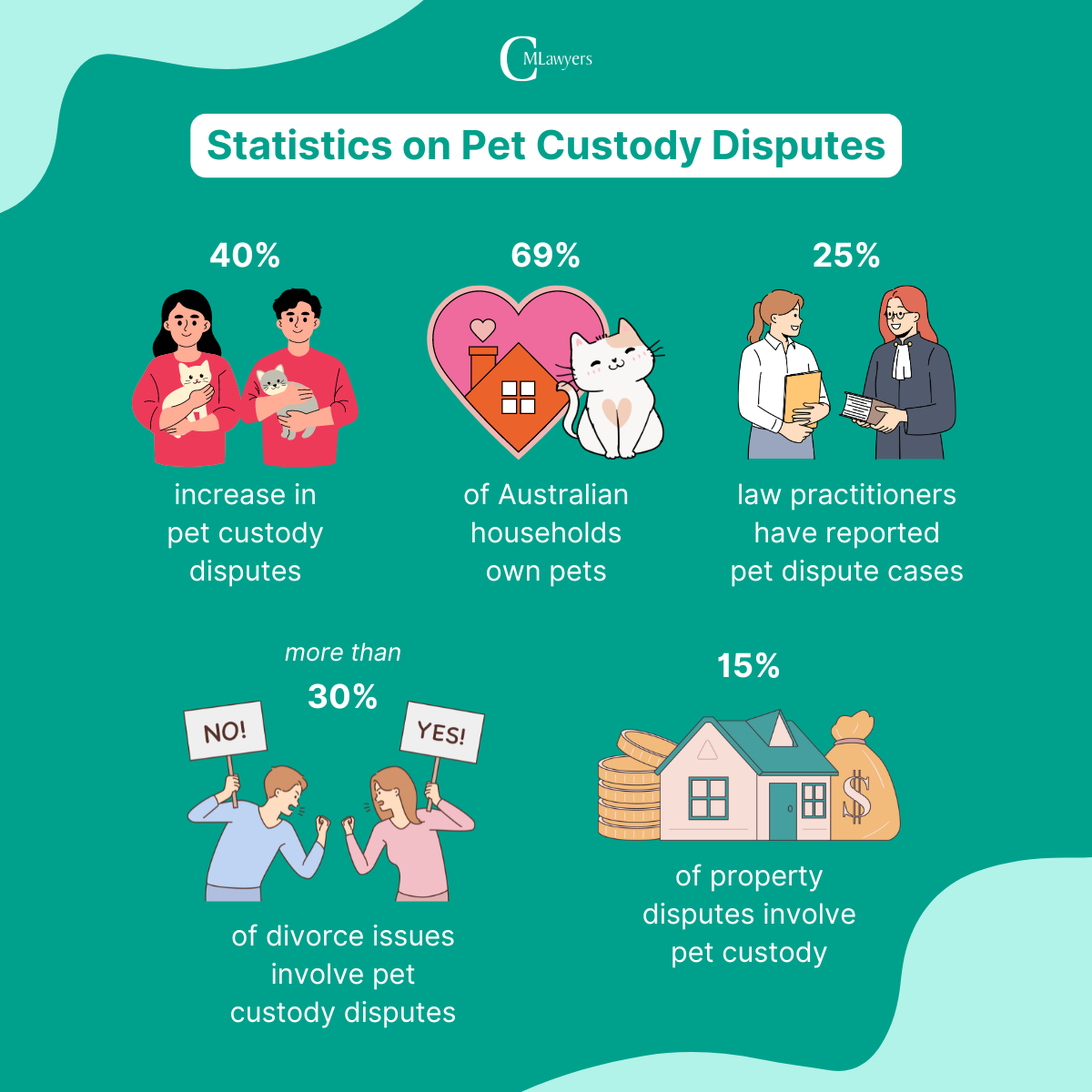A Heartfelt Change for Pets in Australia
Considering Companion Animals When Navigating Family Matters
The way we view and treat our pets is changing in Australia, thanks to the Family Law Amendment Bill 2024. Historically, pets were legally considered property, like a house or car, and disputes over them were handled the same way in separation or divorce. However, with this new bill, Australia now recognizes pets as "companion animals," emphasizing the deep emotional bonds Australians share with their furry friends. This shift paves the way for more thoughtful and fair solutions in pet custody disputes.
Pets in Family Law: The Old Way
Before this amendment, pets were treated like any other piece of property under Australian law (see: 2022 court case on pet custody). The Family Law Act 1975 allowed courts to handle pet custody as part of property settlements during divorces, focusing only on who bought the pet, who paid for their care, and who was taking care of them. Emotional attachments and the well-being of the pets were not considered.
In Gaynor & Tseh [2018], a dispute over a pet dog, B, illustrated how courts avoided making interim rulings about pets until a final property settlement. While this legal approach made sense, it often ignored the deep emotional connections people have with their pets.
The Growing Trend of Pet Custody Disputes
As more Australians have brought pets into their homes, there has been a noticeable rise in pet custody disputes during separations and divorces. Pets have become cherished members of the family, leading to more emotionally charged legal battles. Judges applied property division principles to these cases, which often left pet owners unsatisfied, as the pets' well-being and bonds with their owners weren’t given proper attention.
Statistics on Pet Custody Disputes in Australia
Recent statistics highlight just how significant this issue has become, with a notable rise in pet-related conflicts in family law cases. Based on our research, here are some key numbers that illustrate the evolving legal landscape surrounding pets in Australia.

Source: CM Lawyers Research
- 40% Increase in Pet Custody Disputes: Over the past decade, there has been a 40% increase in pet custody disputes during separations in Australia.
- 69% of Australian Households Own Pets: As of 2023, approximately 69% of households in Australia have pets, a factor driving the rise in pet custody conflicts.
- 1 in 4 Family Law Practitioners: About 25% of family law practitioners have reported handling cases involving disputes over pets in recent years.
- More than 30% of Divorce Cases: It is estimated that in more than 30% of divorce cases, pet custody becomes a contested issue.
- Pet Ownership Linked to 15% of Property Disputes: Family lawyers have observed that around 15% of property disputes involve disagreements over who should keep a pet.
A New Legal Framework: Companion Animals
The Family Law Amendment Bill 2024 marks a significant change by recognizing pets as "companion animals" rather than mere property. This term captures their role as emotional companions and introduces specific criteria for courts to consider when determining pet custody in family law cases, such as:
- How the pet was acquired
- Who has possession of the pet during the dispute
- The level of care each party provided
- Financial and non-financial contributions to the pet's care
- Any history of family violence or cruelty
- The emotional bond between the pet and any children involved
- Each party's ability to care for the pet in the future
This framework allows courts to make more compassionate decisions that better reflect the needs of both the pets and their owners.
No Joint Custody for Pets
The new legal framework under the Family Law Amendment Bill 2024 classifies pets as "companion animals," but it does not permit joint custody or shared ownership of pets. Unlike child custody cases, courts can only assign ownership of a pet to one party or, in certain cases, order the sale of the pet if an agreement cannot be reached.
This approach is intended to provide a definitive resolution and avoid ongoing disputes. However, it presents emotional challenges for those who have formed strong attachments to their pets. For many, pets are considered family members, and the lack of provisions for joint care can leave one party completely cut off from their pet, a situation that can be deeply distressing.
By enforcing sole ownership or sale, the law aims to simplify legal outcomes and avoid protracted custody battles. Still, it may fail to fully consider the emotional ties both parties share with the pet, possibly leading to future discussions about more flexible custody arrangements that balance practicality with the emotional investment of both owners.
Protecting Pets from Family Violence
A crucial aspect of the Family Law Amendment Bill 2024 is its recognition of the connection between pets and family violence, a topic that has often been overlooked in legal proceedings. The new law acknowledges that pets can be used as tools of manipulation or control in abusive relationships, where an abuser might threaten harm to a beloved pet as a way to exert power over their partner. Recognizing this, the Bill allows courts to take into account any history of cruelty or threats against pets when making decisions about custody and ownership.
This development is particularly significant because pets, much like children, can become collateral victims of domestic violence. In some cases, victims of abuse may be reluctant to leave a violent situation for fear of what will happen to their pets if they escape. Studies have shown that victims of domestic violence are more likely to delay leaving abusive relationships if their pets are at risk. With the new law, courts are empowered to consider this dynamic, providing an additional layer of protection for both human and animal victims.
By giving weight to factors such as cruelty and threats against pets, the Bill helps ensure that pets are placed in environments where they will not be subject to harm or used as emotional leverage. It also serves to strengthen the legal protections available to domestic violence survivors by addressing an important aspect of their emotional well-being. For many victims, pets are not just animals but sources of comfort and emotional support, and this legislation acknowledges that these bonds deserve legal consideration.
This change reflects a growing understanding that family violence does not only affect humans—it also impacts the pets who live with them. By including provisions for pets in cases of family violence, the Family Law Amendment Bill 2024 aligns the legal system with the reality of how deeply integrated pets are in the emotional fabric of family life. Ultimately, the law provides a framework that prioritizes the safety and welfare of both pets and their owners, helping to break the cycle of abuse by protecting all vulnerable members of a household.
Looking Ahead: A Brighter Future for Pets in Family Law
The Family Law Amendment Bill 2024 marks a pivotal development in Australia’s family law system, ushering in a more progressive approach to pet ownership. Although pets remain legally classified as property, the bill’s recognition of them as companion animals signifies a notable shift in the legal framework. This change mirrors the growing sentiment among Australians who view their pets as integral members of the family. As family law continues to adapt, further amendments may emerge to better reflect the emotional bonds between pets and their human companions, ensuring their welfare is given the consideration it deserves.
If you have questions about how these legal changes might impact you or your pets, it’s important to seek professional guidance. Contact a legal expert to discuss your situation and receive tailored advice that ensures your family’s needs are met in light of the new legislation.


